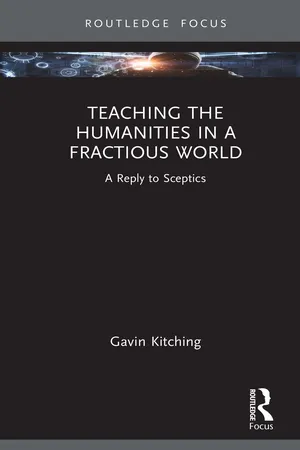
- 136 pages
- English
- ePUB (mobile friendly)
- Available on iOS & Android
About this book
This book confronts an ever more popular suspicion – that a university education in the humanities and social sciences is an 'elitist' indoctrination into 'leftist' or 'liberal' views. Having taught them for nearly 40 years, Gavin Kitching shows that, on the contrary, studying these subjects leads one to question all political and social views (left-wing, right-wing, 'elite', 'popular', religious, secular) and to be sceptical of all the beliefs about human identity (whether racial, gender, national, or class) to which they give rise.
The book is divided into 34 brief sections which can be read as stand-alone discussions of some topic or as sequential steps in an argument. This modular structure makes it an excellent teaching text for students. It is written in an accessible, even colloquial, style which gives it the broadest possible appeal, and its arguments are illustrated by a host of 'everyday' linguistic, sociological and psychological examples. These not only enliven the book but demonstrate that philosophical ideas are most persuasive when used to illuminate non-philosophical matters. Accordingly, Teaching the Humanities… explores such issues as the climate crisis; individualism and postmodernism; nationalism; globalisation and its relationship to economic inequality and political polarisation; all of which are currently the subject of fierce debate inside and outside the university.
Frequently asked questions
- Essential is ideal for learners and professionals who enjoy exploring a wide range of subjects. Access the Essential Library with 800,000+ trusted titles and best-sellers across business, personal growth, and the humanities. Includes unlimited reading time and Standard Read Aloud voice.
- Complete: Perfect for advanced learners and researchers needing full, unrestricted access. Unlock 1.4M+ books across hundreds of subjects, including academic and specialized titles. The Complete Plan also includes advanced features like Premium Read Aloud and Research Assistant.
Please note we cannot support devices running on iOS 13 and Android 7 or earlier. Learn more about using the app.
Information
Table of contents
- Cover
- Half Title
- Title Page
- Copyright Page
- Dedication
- Table of Contents
- Preface
- Acknowledgements
- 1 So What? 1
- 2 Who For?
- 3 Academics Impotent or Potent?
- 4 Academics Pernicious or Virtuous?
- 5 Universities and Knowledge (and Wisdom?)
- 6 Known Unknowns or Unknown Unknowns?
- 7 Critical Thinking
- 8 Cool Views
- 9 Doubts: Philosophical and Non-philosophical
- 10 The Crunch
- 11 Patriotism and Me
- 12 Globalisation and Me
- 13 Political Ignorance
- 14 Knowing Better
- 15 Patriotism, Globalisation, and Me
- 16 Patriotism and Me: Yet More
- 17 An Imagined Time Machine
- 18 How Come?
- 19 Community and Money
- 20 Modernity 1
- 21 Modernity 2
- 22 Modernity 3
- 23 Who’s Who
- 24 Modernity and Knowledge
- 25 Modernity and Capitalism
- 26 Watts Up
- 27 Nasty Catches
- 28 Back to the Campus
- 29 Really
- 30 History and Philosophy
- 31 Words and Doings
- 32 Social Relations
- 33 Another Evil Demon
- 34 So What? 2 (or ‘See Other Sections’ – SoS)
- Appendix: Questions and Answers
- Select Bibliography
- Index